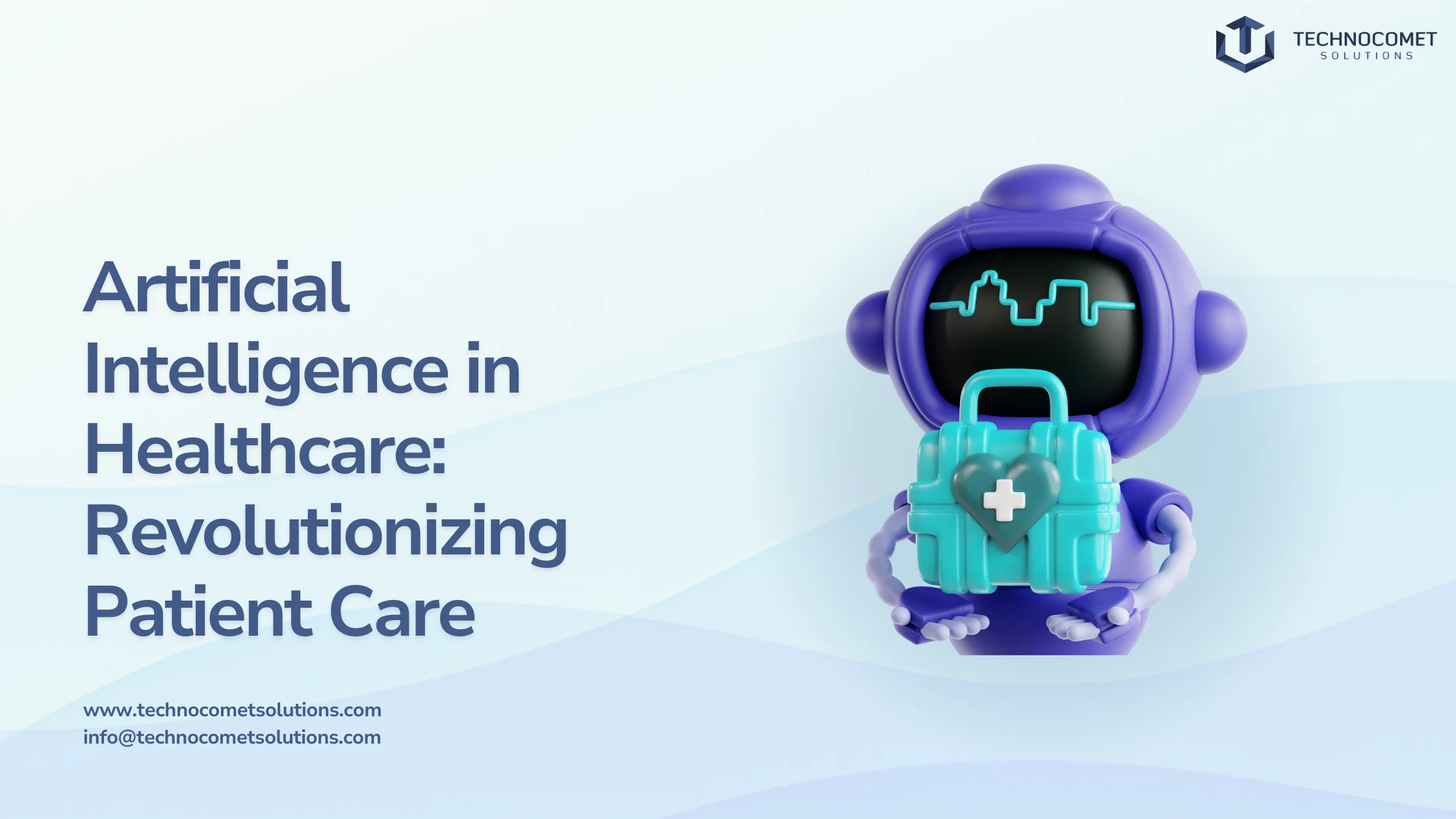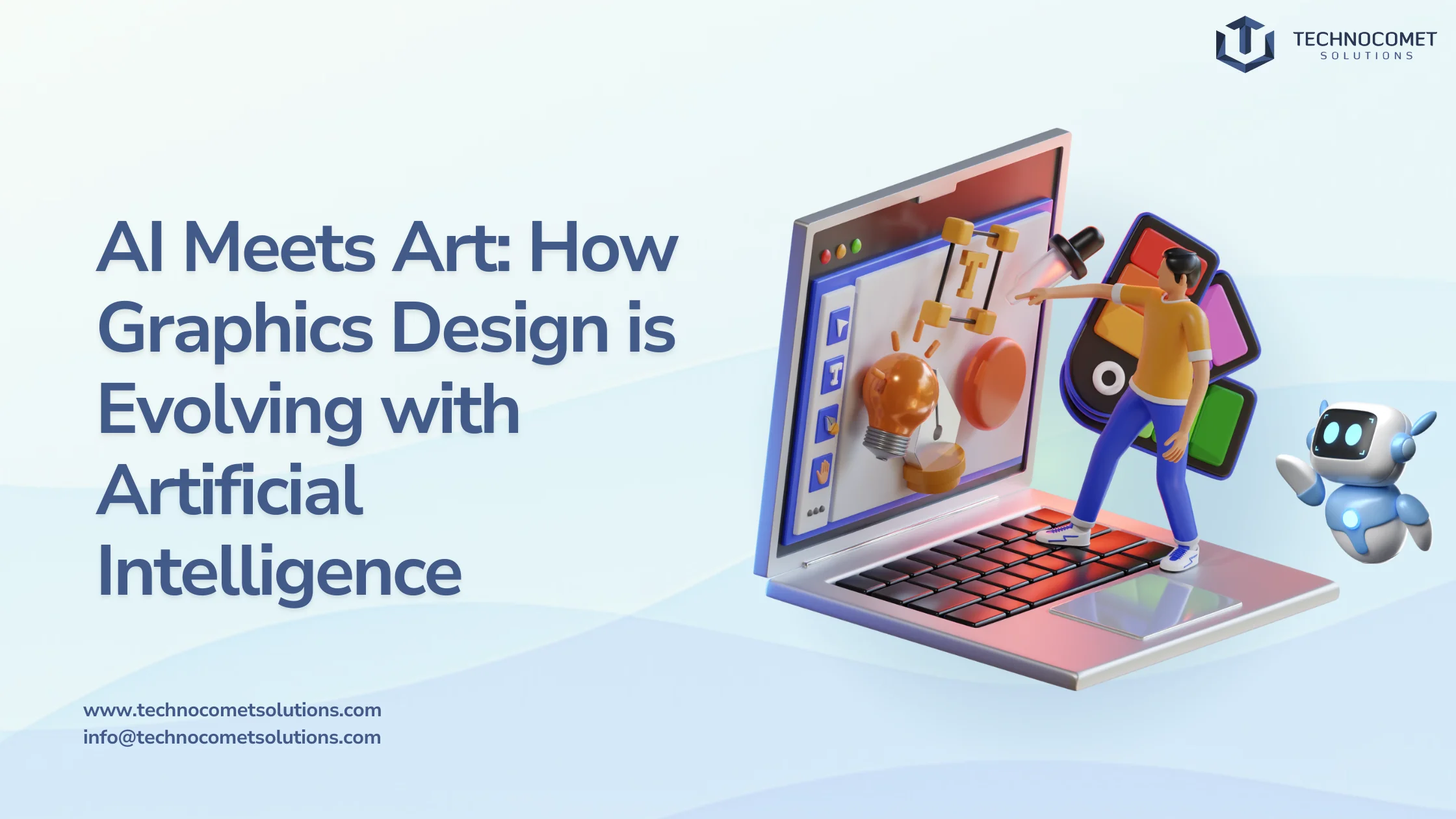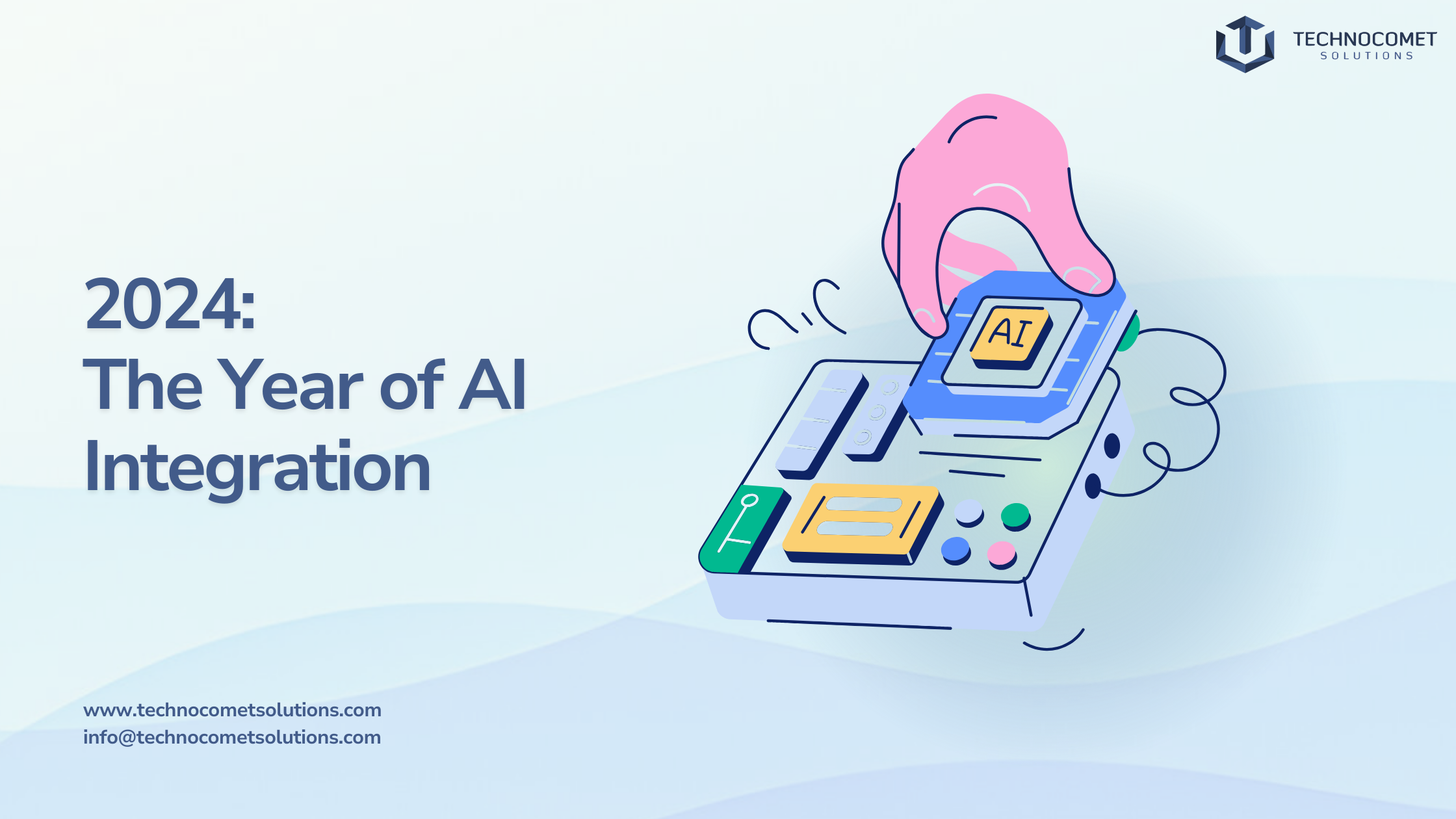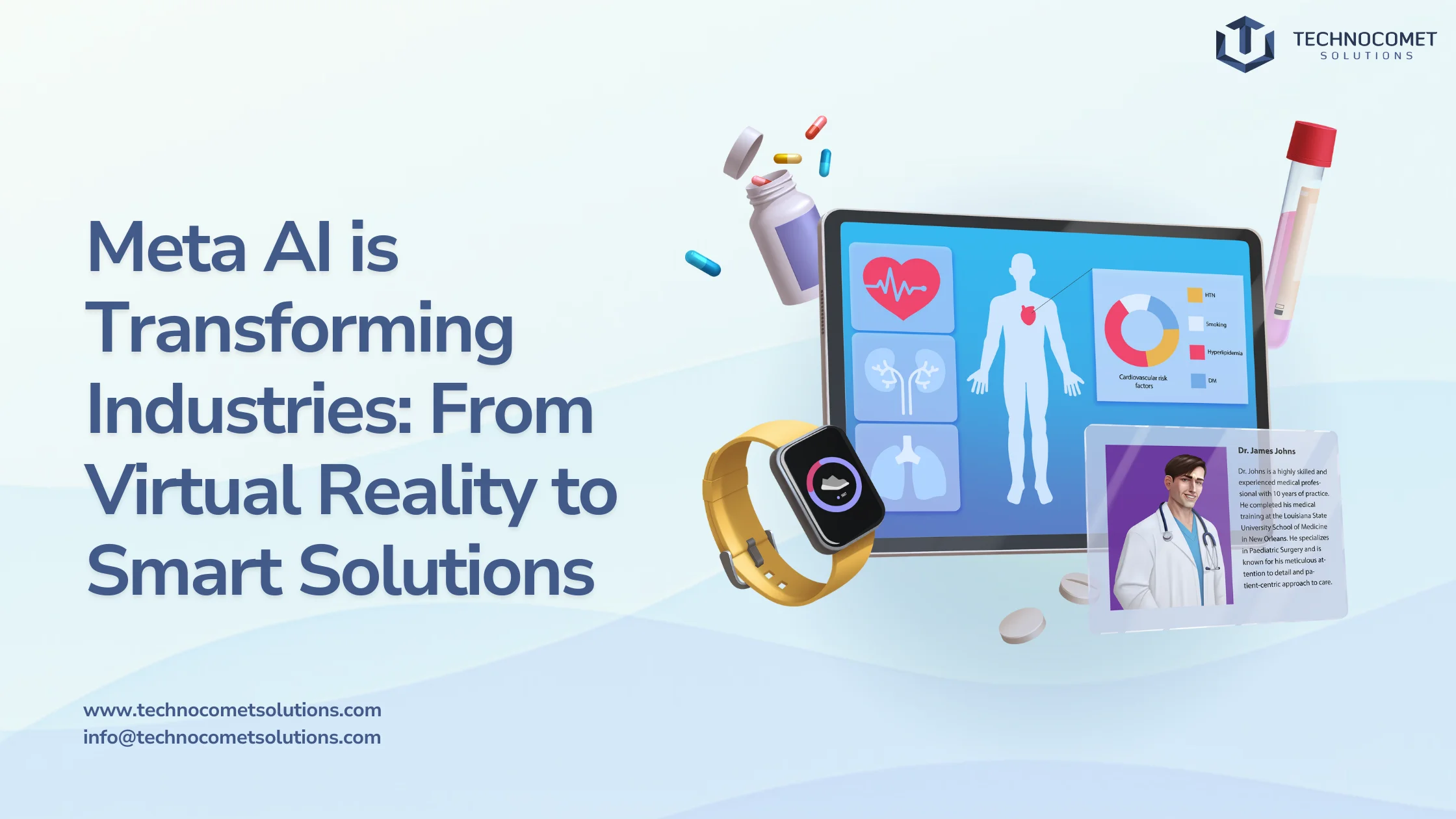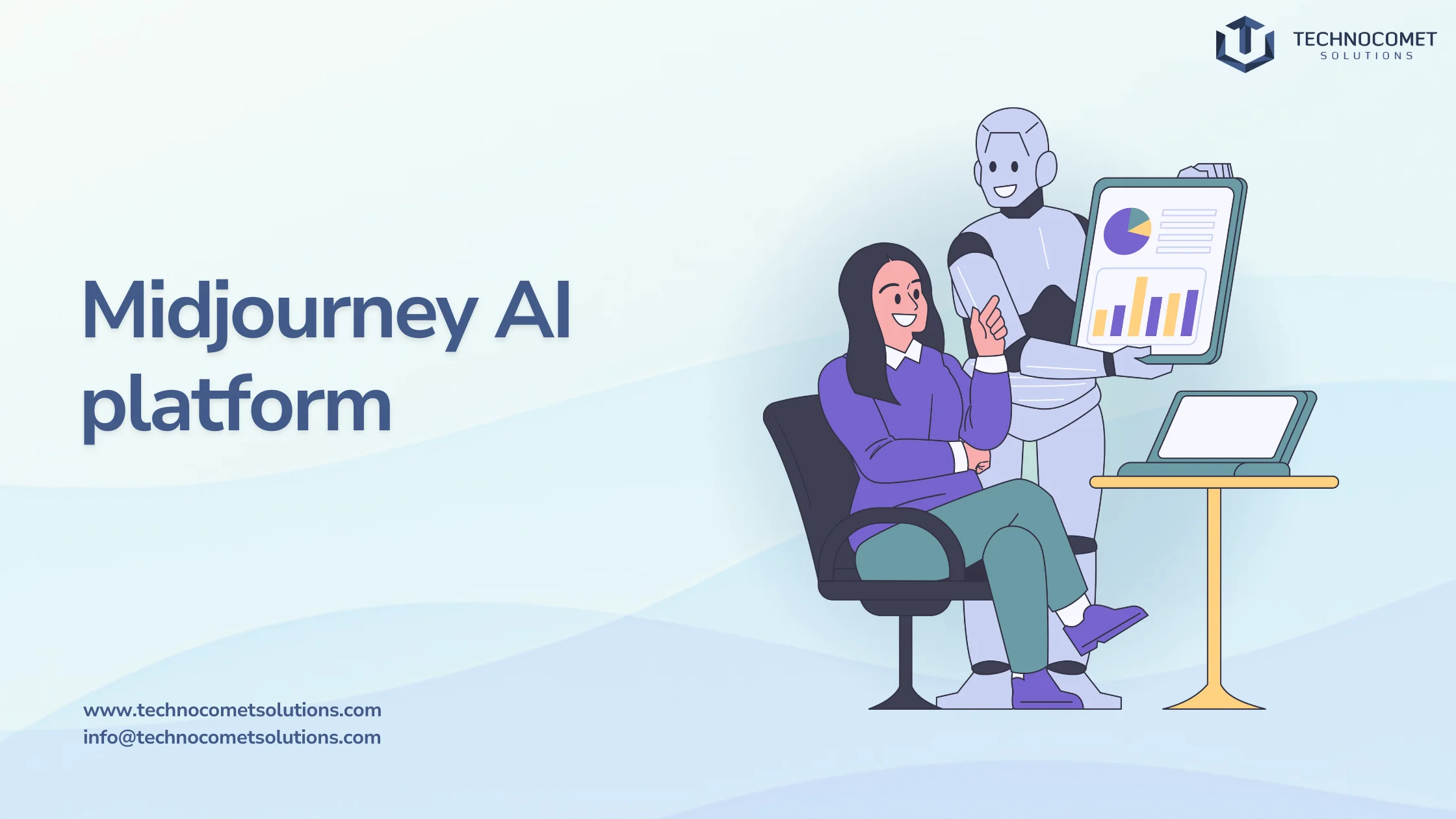Introduction
Artificial intelligence (AI) is rapidly transforming healthcare, reshaping how we diagnose, treat, and manage patient care. The integration of artificial intelligence in healthcare is bridging gaps in patient care through innovative solutions, enhancing the overall quality of service. With AI, healthcare providers can analyze vast amounts of data quickly and efficiently. Companies like TechnoComet Solutions are driving this transformation by delivering AI-powered tools that enable more accurate diagnoses and personalized treatment plans. Patients are benefiting from faster access to care and improved health outcomes. As AI continues to evolve, its applications in healthcare will only expand further. This transformation promises to make healthcare more efficient and accessible for everyone.
In this blog, we will explore the potential of artificial intelligence in healthcare, focusing on its role in precision medicine, operational efficiency, and the ethical considerations that accompany its use.
The Growing Role of Artificial Intelligence in Healthcare
AI’s impact on healthcare is profound and far-reaching. It allows for the analysis of vast amounts of data, leading to more accurate diagnoses and personalized treatment plans. As healthcare providers increasingly adopt artificial intelligence in healthcare, they are discovering new ways to improve patient outcomes and streamline operations. This technology is not just a passing trend; it is becoming a fundamental part of modern medical practice. By leveraging AI, healthcare systems can enhance their capabilities significantly. The integration of AI also fosters collaboration among healthcare professionals, leading to better teamwork.
This collaboration enhances communication, ensuring that all team members are aligned in their approach to patient care. As a result, patient care becomes more coordinated and comprehensive. This collaborative approach ultimately enhances the overall patient experience.
Bridging Gaps in Patient Care Through Innovation
By automating routine tasks and providing real-time insights, AI helps bridge gaps in patient care. This innovation ensures that healthcare professionals can focus more on direct patient interactions rather than administrative duties. The use of artificial intelligence in healthcare also enhances communication between patients and providers. Through AI-driven tools, patients receive timely information about their health conditions, leading to better engagement and satisfaction. This proactive approach fosters a stronger patient-provider relationship. Additionally, AI can help identify at-risk patients early on, allowing for timely interventions that can prevent complications.
These interventions not only improve individual health outcomes but also contribute to overall public health efforts. As a result, overall health outcomes improve significantly across populations. Ultimately, these innovations lead to a more holistic approach to healthcare delivery.
Overview of AI’s Potential in Precision Medicine
Precision medicine aims to customize treatment based on individual characteristics, including genetics and lifestyle. AI plays a crucial role in analyzing this data to provide personalized treatment options, making it a cornerstone of modern artificial intelligence in healthcare. With artificial intelligence in healthcare, doctors can make informed decisions that are specifically customized to each patient’s needs. This approach not only improves treatment efficacy but also minimizes adverse effects that can arise from one-size-fits-all solutions. As research continues to evolve, the possibilities for personalized therapies expand significantly.
The ability to analyze large datasets quickly enables researchers to uncover new insights about diseases that were previously difficult to understand. These insights can lead to breakthroughs in understanding complex conditions better than ever before.
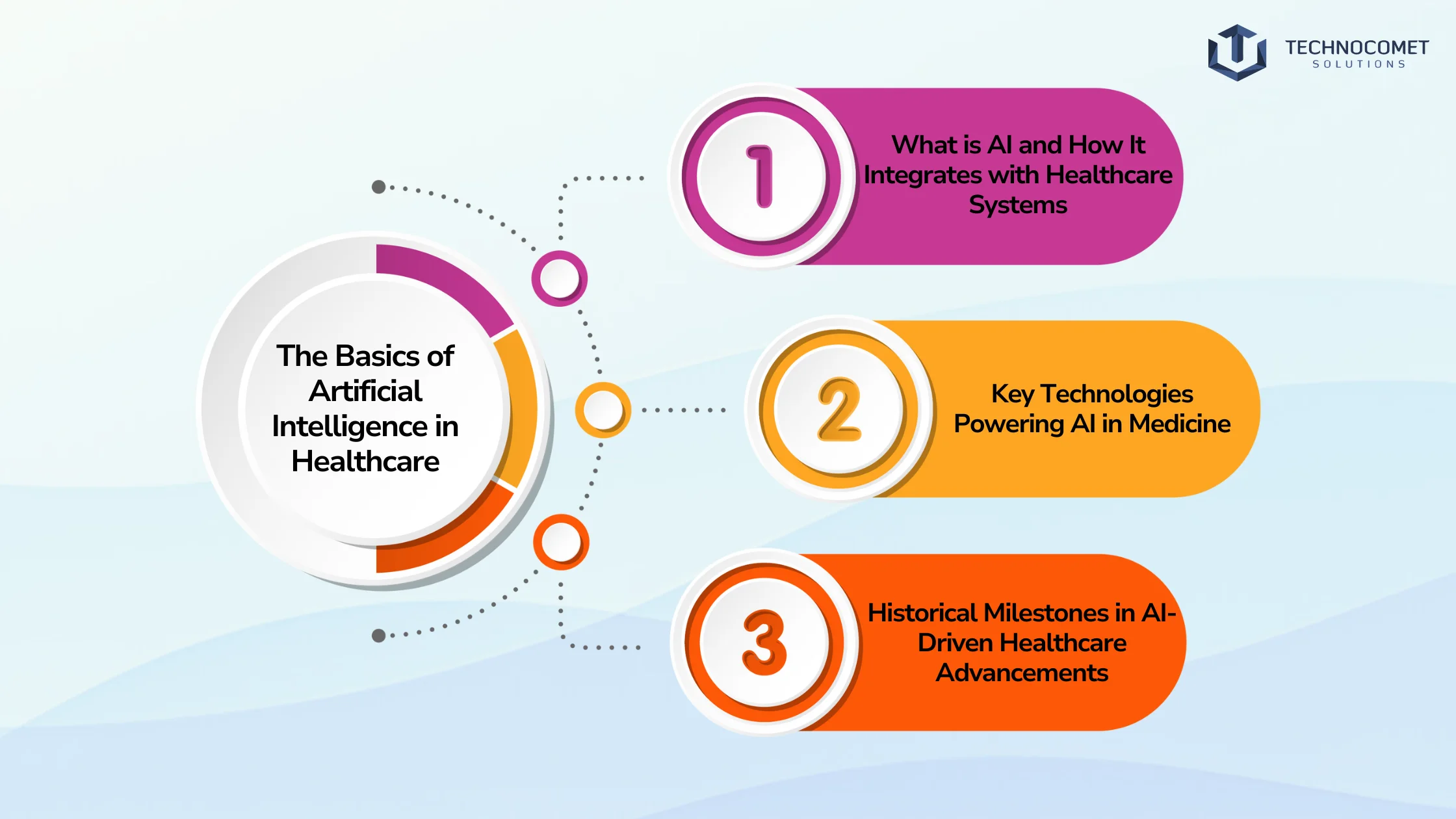
The Basics of Artificial Intelligence in Healthcare
What is AI and How It Integrates with Healthcare Systems
Artificial intelligence refers to the simulation of human intelligence processes by machines, particularly computer systems. In healthcare, AI integrates with existing systems to enhance decision-making processes and improve patient outcomes. The application of artificial intelligence in healthcare is revolutionizing how medical professionals approach diagnostics and treatment planning. By utilizing AI tools, clinicians can access critical information faster than ever before. This speed allows for quicker interventions when time is crucial for patient health.
Furthermore, AI can assist in identifying patterns that humans might overlook during data analysis, leading to more accurate assessments of patient conditions. As a result, clinical decisions become more data-driven and evidence-based.
Key Technologies Powering AI in Medicine
Several key technologies are driving the adoption of artificial intelligence in healthcare. Machine learning enables systems to learn from data and improve over time, enhancing decision-making capabilities. Natural language processing (NLP) allows computers to understand and interpret human language, facilitating better communication and analysis of medical records. Robotics plays a crucial role in surgeries and other medical procedures, improving precision and outcomes. Together, these technologies significantly enhance the capabilities of healthcare providers, creating a powerful framework for improving patient care across various settings.
They also enable remote monitoring and telehealth services, which have become essential during recent global health crises. As these technologies evolve, their applications will continue expanding into everyday medical practices, making them indispensable for the future of healthcare.
Historical Milestones in AI-Driven Healthcare Advancements
The journey of artificial intelligence in healthcare began with simple algorithms for data analysis and has rapidly evolved over time. Significant milestones include the development of IBM’s Watson for Oncology, which transformed how cancer treatments are analyzed. Google’s DeepMind achieved groundbreaking results in diagnosing eye diseases, showcasing the potential of AI in medical imaging. The rise of telemedicine powered by AI chatbots further highlights the integration of AI into patient care. These advancements demonstrate the growing significance of artificial intelligence in healthcare and the remarkable progress made so far.
Each milestone builds upon previous achievements, inspiring ongoing research to harness AI’s full potential across various medical fields and specialties.
Revolutionizing Patient Care with Artificial Intelligence in Healthcare
Enhancing Diagnostics with Machine Learning and AI Algorithms
AI algorithms can analyze medical images faster and more accurately than human radiologists ever could! This capability is crucial for early disease detection, particularly in conditions like cancer where time is often critical! The use of artificial intelligence in healthcare allows for quicker diagnosis and timely intervention that can save lives! With machine learning, diagnostic tools are constantly improving as they learn from new data collected over time! This continuous improvement ensures that diagnostic accuracy keeps pace with evolving medical knowledge while adapting best practices accordingly!
Furthermore, artificial intelligence in healthcare can assist radiologists by highlighting areas of concern within images that require closer examination, enhancing their workflow efficiency dramatically! As a result, patients receive faster diagnoses that lead directly toward better treatment outcomes!
AI-Powered Virtual Assistants and Telemedicine Solutions
Virtual health assistants powered by AI provide 24/7 support to patients by answering queries promptly while reminding them about medications! Telemedicine solutions have also gained traction recently, allowing patients to consult doctors remotely through artificial intelligence in healthcare platforms! This accessibility improves patient engagement while enhancing adherence rates toward treatment plans, reducing barriers associated with traditional visits significantly! Patients can receive care from the comfort of their homes, especially beneficial for those with mobility issues or chronic conditions requiring frequent monitoring!
Additionally, virtual consultations reduce travel time along with associated costs for patients seeking care, making it easier than ever before! Overall, these innovations make artificial intelligence in healthcare more accessible than ever before, ensuring everyone gets timely attention when needed most!
Personalized Treatment Plans Based on Patient Data
By analyzing individual patient data, such as genetic information, along with comprehensive medical history, AI can help create personalized treatment plans that are far more effective than traditional approaches! The integration of artificial intelligence in healthcare enables custom therapies based on specific profiles unique to each individual! This personalized approach leads directly toward improved health outcomes while increasing overall satisfaction among patients dramatically!
As the ability to predict potential side effects allows clinicians to adjust treatments proactively ensuring optimal results throughout the entire process! As a result, patients experience fewer complications during their care journey, ultimately leading them toward healthier lives overall!
Precision Medicine: AI’s Role in Customized Treatments
How AI Analyzes Genetic, Environmental, and Lifestyle Data
AI systems can process complex datasets that include genetic information along with environmental factors & lifestyle choices effectively! This analysis helps identify the most effective treatments for individuals based on their unique profiles and accordingly! The role of artificial intelligence in healthcare is critical for advancing precision medicine initiatives globally while improving overall effectiveness across various specialties! By leveraging these insights, clinicians make more informed decisions about patient care while minimizing trial-and-error approaches often seen previously within traditional models!
Additionally, this capability enables researchers to identify trends across populations, informing public health strategies effectively moving forward!
Breakthroughs in Disease Prediction and Prevention
AI has made significant strides predicting diseases before they manifest, saving countless lives through timely interventions! For instance, predictive analytics can identify patients at risk for conditions like diabetes or heart disease based on their comprehensive health records collected over time! Utilizing artificial intelligence in healthcare allows proactive interventions preventing disease progression altogether while enhancing the quality of life experienced daily by individuals affected by chronic illnesses! Early detection not only improves outcomes but also reduces overall costs associated with treating advanced stages significantly over time!
These advancements empower patients with knowledge about their health risks so they can take preventive measures effectively while remaining engaged throughout the process!
Real-World Applications of AI in Oncology and Rare Diseases
In oncology, AI technologies assist oncologists by providing invaluable insights into tumor behavior & treatment responses based on real-time data analysis techniques employed today! For rare diseases where data may be limited, AI can help identify patterns leading towards better diagnosis & treatment options through artificial intelligence applications within various sectors today! These advancements are crucial for improving survival rates while enhancing the quality of life of affected individuals who face daily challenges navigating complex conditions requiring specialized attention regularly!
By harnessing large datasets effectively, healthcare professionals gain powerful tools for decision-making. Advanced algorithms of artificial intelligence in healthcare customized for oncology or rare diseases enable swift and accurate insights. These tools maximize opportunities and enhance the quality of care.
Operational efficiency of artificial intelligence in healthcare
Streamlining Administrative Processes and Reducing Workload
AI automates routine administrative tasks such as scheduling appointments & processing insurance claims efficiently without compromising quality service provided overall! This automation reduces the workload on healthcare staff while integrating artificial intelligence in healthcare into daily operations effectively ensuring smooth workflows throughout organizations involved, collectively together moving forward hand in hand towards a brighter future ahead filled with hope, promise, and healing journeys awaiting us all ahead!
Staff members are freed from mundane tasks, allowing them to focus on providing exceptional care. This ensures that urgent patient needs are addressed effectively during challenging times. By streamlining operations, teams can work collectively toward a brighter future. Together, they create healing journeys filled with hope and promise.
Optimizing Supply Chain Management and Resource Allocation
AI tools help hospitals manage their supply chains efficiently by predicting demand for medical supplies based on historical data along with current trends related to artificial intelligence practices utilized today effectively ensuring availability when needed most without unnecessary waste shortages affecting overall operations negatively, impacting bottom line profitability. long-term success goals achieved collectively together moving forward hand in hand towards a brighter future ahead filled with hope, promise, and healing journeys awaiting us all ahead!
Additionally, by analyzing usage patterns, hospitals can adjust inventory levels proactively. This ensures they meet fluctuating demands while maintaining cost-effectiveness. Streamlined supply chain processes enhance efficiency across operations. Together, artificial intelligence in healthcare efforts contribute to a brighter future, filled with hope, promise, and healing journeys.
Predictive Analytics for Patient Flow and Staffing Needs
Using predictive analytics powered by artificial intelligence within various sectors today, facilities forecast patient admissions while optimizing staffing levels accordingly, ensuring resources are available when needed most during peak times, ensuring quality care is delivered consistently across the board, no matter the challenges faced and daily challenges encountered regularly throughout operations involved collectively together moving forward hand in hand towards a brighter future ahead filled with hope, promise, and healing journeys awaiting us all ahead! By anticipating fluctuations in service demands, healthcare organizations can respond effectively without compromising quality or efficiency.
This approach ensures smoother operations across various departments. Proactive planning positions teams to handle challenges seamlessly. Together, these efforts pave the way for a brighter future filled with hope, promise, and healing journeys.
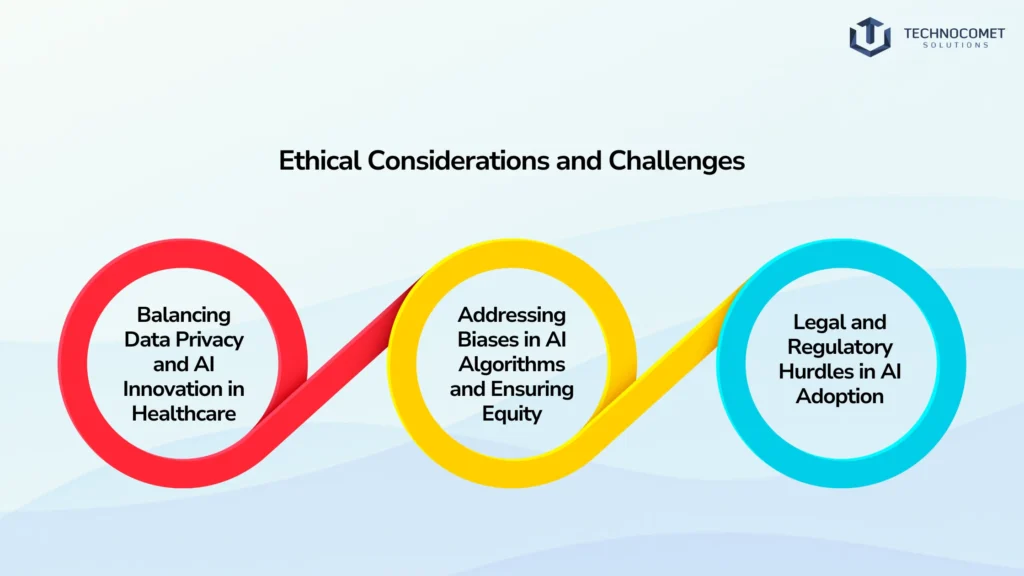
Ethical Considerations and Challenges
Balancing Data Privacy and AI Innovation in Healthcare
As artificial intelligence in healthcare relies heavily on data collection, maintaining patient privacy remains paramount in industries today, particularly in sensitive areas like healthcare. Trust, built among stakeholders, is essential for ensuring compliance with existing laws that protect both practitioners and patients. This fosters trust across the board, ensuring responsible data use while preventing breaches or misuse. Navigating this fine line is crucial for securing sensitive information and maintaining transparency.
By doing so, the healthcare industry can move forward, ensuring a brighter future and fostering healing journeys for all.
Addressing Biases in AI Algorithms and Ensuring Equity
Biases inadvertently built into algorithms, if training datasets aren’t representative enough across diverse populations using artificial intelligence solutions within various sectors today, must be addressed proactively. This ensures equitable access and opportunities are available to everyone, regardless of background or demographics. It is crucial to ensure inclusivity is promoted in technological advancements so everyone benefits equally from the innovations brought forth. This requires ongoing monitoring and adjustments to be made as necessary, ensuring all individuals receive fair treatment, regardless of their background or demographics.
By doing so, inclusivity will be promoted, and technological advancements will benefit everyone equally, leading to a brighter future filled with hope and promise. This collaborative approach will help ensure healing journeys are awaiting us all ahead.
Legal and Regulatory Hurdles in AI Adoption
The rapid advancement of modern-day artificial intelligence in healthcare technology often outpaces regulatory frameworks governing its use within various sectors, including healthcare. Navigating legal challenges becomes crucial for the safe implementation of AI in hospitals, ensuring compliance with existing laws that protect both practitioners and patients. This fosters trust among stakeholders, allowing them to collaborate effectively toward a brighter future. It is essential to develop adaptive guidelines that respond to the evolving landscape of ethical considerations.
By doing so, we ensure that safety and efficacy are maintained without compromising the quality standards expected throughout the industry. This collaborative approach will pave the way for a future filled with hope, promise, and healing.
Future Trends of Artificial Intelligence in Healthcare
Expanding AI’s Reach in Remote Underserved Areas
AI has immense potential to enhance access by providing telehealth services that connect patients and providers, regardless of location. Through innovative uses of artificial intelligence across various sectors, it eliminates the barriers of distance, ensuring that everyone receives the necessary attention to maintain optimal wellness levels. This technology addresses geographical constraints and daily challenges encountered in healthcare operations, ensuring equitable distribution of resources.
By maximizing every opportunity, artificial intelligence in healthcare ensures that everyone benefits from innovations designed to meet the needs of diverse populations requiring specialized care. This collective effort moves us toward a brighter future filled with hope, promise, and healing.
Integration of AI with Wearable Technology IoT
The future is likely to see increased integration of artificial intelligence across industries, including wearable devices that continuously monitor health metrics. These devices provide real-time feedback to both patients and providers, fostering healthier lifestyles through informed decision-making. Analytics derived from smart technologies will enable more effective wellness management, ensuring that everyone benefits from these innovations.
By empowering individuals to take charge of their own health journeys, artificial intelligence in healthcare will promote healthier lifestyles and create a brighter future, filled with hope, promise, and healing. Together, we will move toward this future, benefiting from advancements that enhance overall well-being.
Potential Advancements Drug Discovery Medical Robotics
Artificial intelligence in healthcare is set to revolutionize drug discovery by predicting interactions between new pharmaceuticals and the human body. Advanced models based on current research efforts will significantly enhance the efficiency and accuracy of drug development processes. This will benefit countless individuals seeking restorative treatments, ensuring that everyone benefits from these innovations. Additionally, advancements in robotics will further enhance surgical precision, leading to safer procedures and shorter recovery times.
These technological advancements will improve patient outcomes, moving us toward a brighter future filled with hope, promise, and healing for all. Together, we will benefit from these innovations, improving lives across the globe.
Conclusion
The integration of artificial intelligence within various sectors, including health care, isn’t just a trend; it represents a fundamental shift towards more efficient, personalized care across all areas! As we continue exploring its potential across domains, from diagnostics to operational efficiency, the benefits become increasingly evident each day passing us by! However important, it remains essential to address ethical considerations to move forward into this new era filled with exciting possibilities surrounding innovative uses found throughout artificial intelligence today! Embracing these changes ultimately leads us closer to improved outcomes while creating an overall efficient system benefiting everyone involved collectively, together moving forward hand in hand towards a brighter future ahead filled with hope, promise, and healing journeys awaiting us all ahead!
For those looking for IT services that can help integrate artificial intelligence in healthcare, TechnoComet Solutions is here to assist you. Our expertise in AI technology can streamline your operations and enhance patient care. Contact us today!
FAQs
AI enhances patient care by automating administrative tasks, improving diagnostic accuracy, and providing personalized treatment plans. The integration of artificial intelligence in healthcare allows healthcare professionals to focus more on direct patient interactions, ultimately leading to better health outcomes and increased patient satisfaction.
AI algorithms can analyze vast amounts of medical data quickly, identifying patterns and anomalies that may be missed by human professionals. By utilizing artificial intelligence in healthcare, providers can achieve earlier diagnoses and implement timely interventions that save lives.
Yes, AI can significantly reduce healthcare costs by streamlining operations, automating routine tasks, and minimizing diagnostic errors. The use of artificial intelligence in healthcare improves efficiency, allowing healthcare organizations to allocate resources more effectively and reduce unnecessary expenditures.
Ethical considerations include ensuring data privacy, addressing biases in AI algorithms, and maintaining a balance between technology and human expertise. It is essential to implement artificial intelligence in healthcare responsibly to enhance patient care without compromising ethical standards or equity in treatment.

